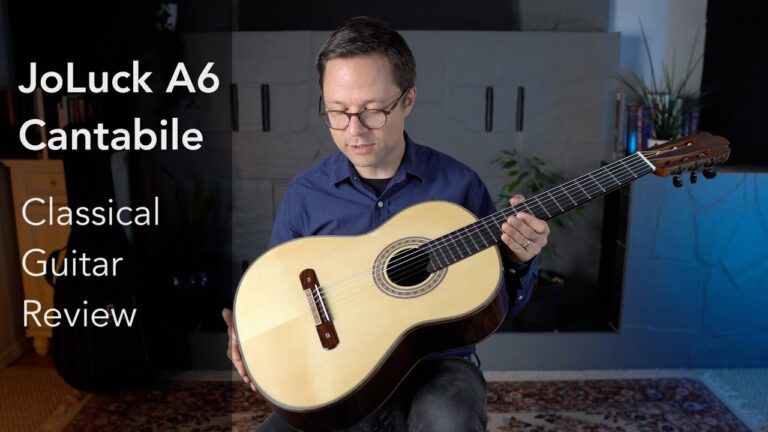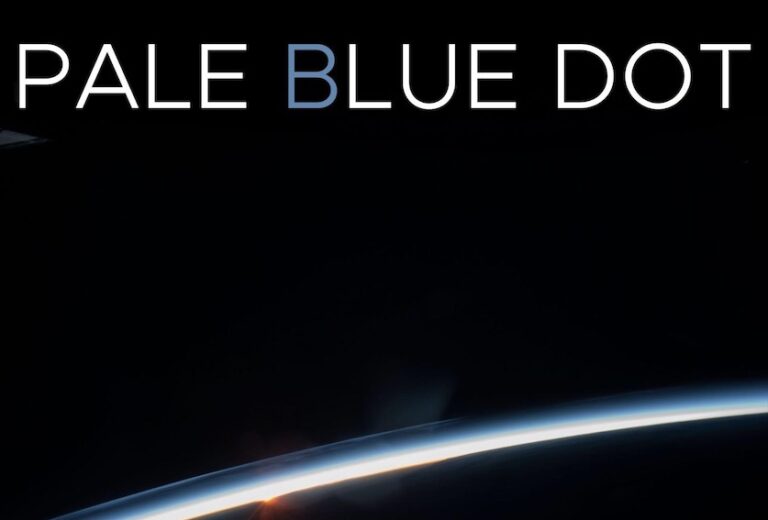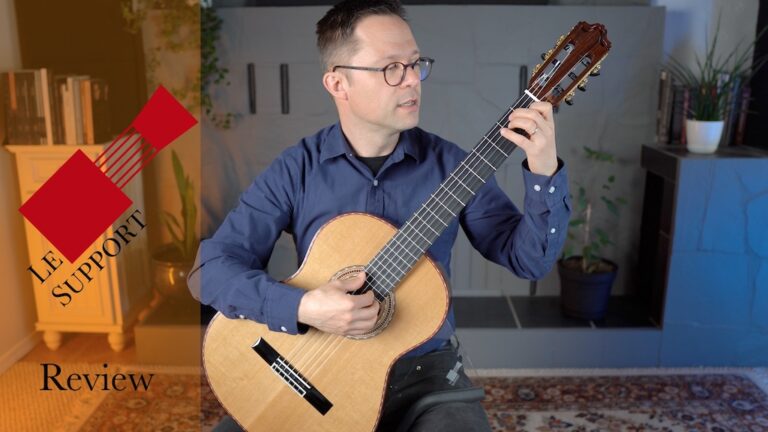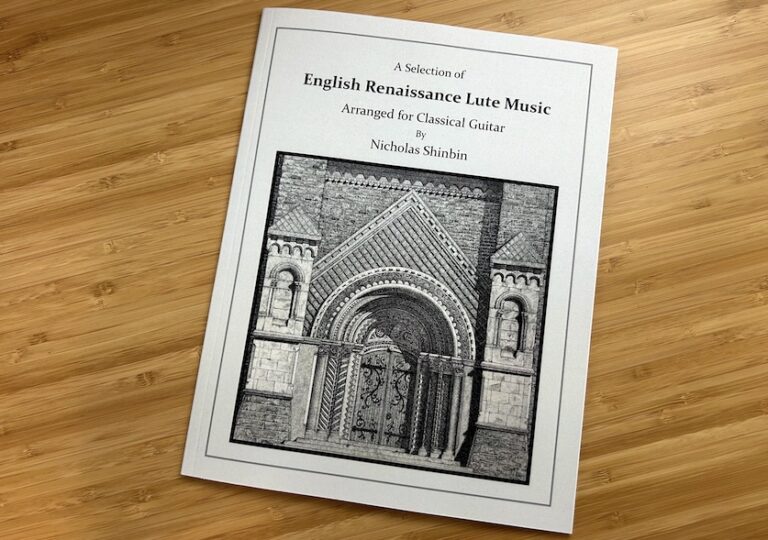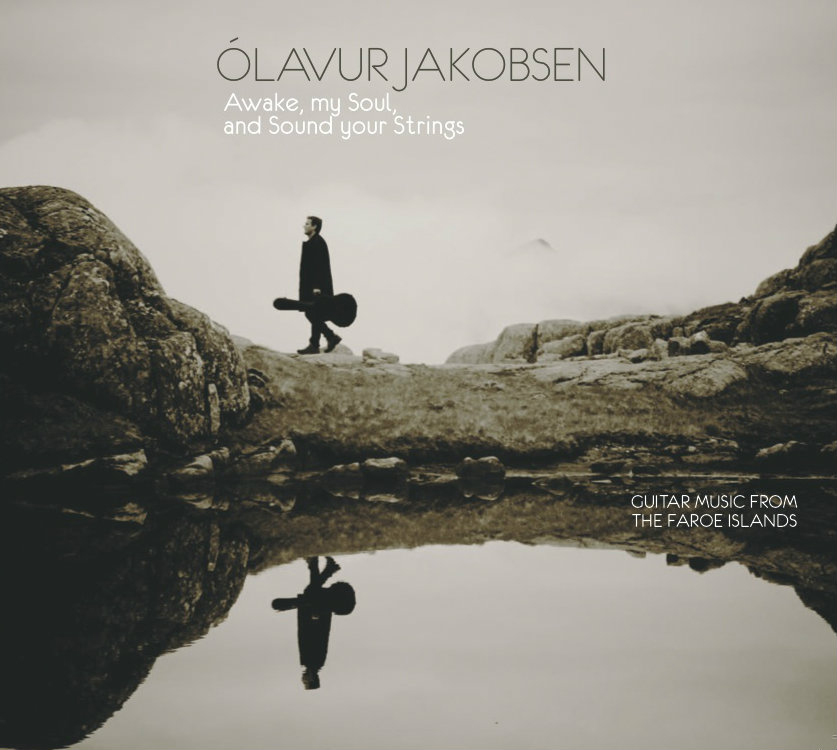
Awake, my Soul, and Sound your Strings by Ólavur Jakobsen
Guitar Music from the Faroe Islands
Artist Website: www.olavurjakobsen.com
Label: www.tutl.com
Listen to samples or buy the album via Amazon
I love receiving unique and interesting albums such as this release by Ólavur Jakobsen. The album is conceptually unified as the first classical guitar album with solely Foroese music performed by a Foroese artist. Jakobsen, born in Tórshavn, Faroe Islands, has studied in Denmark and Europe and splits his time between teaching, performing, touring and promoting Faroese music.
The album begins with two arrangements by Jakobsen. The first arrangement is of William Heinesen’s (1900-1991) Awake, my Soul, and Sound your Strings originally for solo viola. Based on a Faroese tradition of religious singing and a Danish hymn by Thomas Kingo, it’s a simple theme with variations ranging from classical era takes to folk-like additions and much harmonic exploration. Jakobsen plays the work with a simple but very musical interpretation with great phrasing and a wonderful vocal quality to the cadences. The other arrangement, Paraphrase by Jógvan Waagstein (1879-1949), is, as the title suggests, a paraphrase of a Faroese melody based on the Icelandic hymn, Ljómurnar. Originally for organ, it translates well to the guitar. However, I would imagine that on organ this is a very different work. It is rather spacious on guitar but has a peaceful character that I enjoyed.
Pictures by Kári Bæk (b. 1950), for which there are nine small movements, is reminiscent of Mussorgsky’s famous Pictures at an Exhibition, musically exploring a number of artworks by Olsen, Joensen, Reyni, SJ-Mikines. I can hear much of Mussorgsky’s language here and the tribute is purposeful with marked ‘Promenades’ throughout but there are also touches of other styles and musical eras. Movement, IV “Self Portrait” was one of my favorites for its rhapsodic mood and varied textures and guitar orchestrations. Jakobsen handled the first two works on the album with a simple style but here he pulls out some nice Breamian orchestration and character. A solid composition and an excellent performance by Jakobsen, this work should start making the rounds if it hasn’t already.
As the programme notes state “Caccia means ‘hunt’, as well as being an Italian musical form from the 14th century – a combination of voices in canon and free voices.” Caccia by Sunleif Rasmussen (1961) is a very interesting work. Jakobsen is joined here in duet with guitarist Alvi Joensen. Rasmussen, 2002 Nordic Music Prize Winner, re-explores a number of his previous works here. The musical language is very curious ranging from displaced scale interactions to polyrhythmic eruptions. At times I hear everything from Ravel, Babbit, Carter, to Crumb…maybe some Davidovsky too? There is a wealth of guitar effects and soundscapes in this work and I’m pretty sure some whistling too! Excellent execution of the difficult musical material by Jakobsen and former student Joensen.
The other work by Rasmussen Suite for Guitar (2007) is structurally a Baroque suite. The work begins with a sense of musical security in the Baroque rhythmic grounding despite modern musical language. However, by the end of the work the grounding has disappeared and with the addition of an electronic tape part the listener gradually slides into a warped and different soundscape. Jakobsen plays beautifully with the electronics, often blurring the definition between the parts.
40 Mile Ground (2005) by Kristian Blak is a fantasy of sorts with modern language but very listenable to general audiences still. This work has some excellent and effective writing for guitar. The work has everything from beautiful harmonic writing to extended guitar techniques and sounds. A very imaginative work and Jakobsen again pulls it off with style.
Recording quality is excellent. Jakobsen is a clean player overall and could have come off as dry but the quality of the recording helped to keep it elegant sounding.
I have little in the way of criticisms as Jakobsen’s playing is clean and driven. Plus, the music was all a curiosity for me and a joy to explore. The music itself was somewhat spacious but there was still enough excitement to keep me going. General listeners might find that the album descends into ‘modern’ musical language at a gradual rate from start to finish. I, for one, enjoyed that aspect but general listeners who don’t appreciate new music might want to listen to sample tracks. Guitarists will love the extended techniques and soundscapes as well the excellent compositions throughout.
Conclusion:
A wonderful album of music from the Faroe Islands by Faorese guitarist Ólavur Jakobsen. Jakobsen displays a wealth of diversity and flexibility in his style. From soothing and simplistic textures to extended techniques and alternative soundscapes he pulls off the album with artistic sensitivity and style. There are a number of excellent compositions, in particular the works of Rasmussen contain a rich amount of compositional and guitaristic interest. I love the album for Jakobsen’s clean and inspired playing but also for its conceptual integrity.
Listen to samples or buy the album via Amazon
Biography (see more at his website):
Ólavur Jakobsen was born 1964 in Tórshavn in The Faroe Islands.
Took up the guitar as a child. Inspired by his guitar playing father he mainly played popular, country and rock music. He was introduced to Chet Atkins, Hank B. Marvin and Django Reinhardt. In the early years he was profoundly influenced by Led Zeppelin, The Beatles and Jimi Hendrix. It was after hearing the old master Andrés Segovia and later Sir Julian Bream that spurred him on to play classical guitar.
Largely self-taught as a classical guitarist he commenced his studies at the Royal Danish Academy of Music in Copenhagen in Denmark with guitarist Ingolf Olsen.
Further studies in Paris with French guitarist Roland Dyens and masterclasses with Sir Julian Bream and David Russell.
He is co-founder of the Faroese chamber ensemble Aldubáran.
He lives in The Faroe Islands and divides his time between teaching, performing, touring and promoting Faroese music.
Apart from the two arrangements of com- positions based on traditional Faroese music, all the music on this disc has been written for and dedicated to Ólavur Jakobsen.

